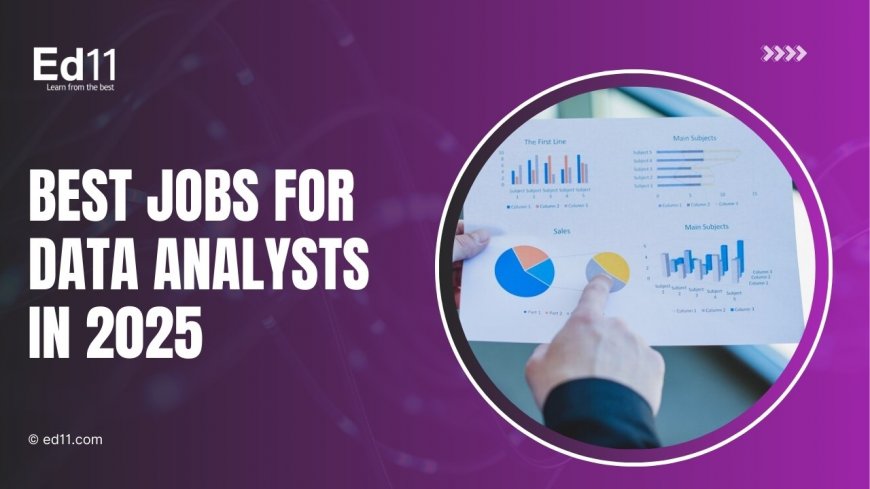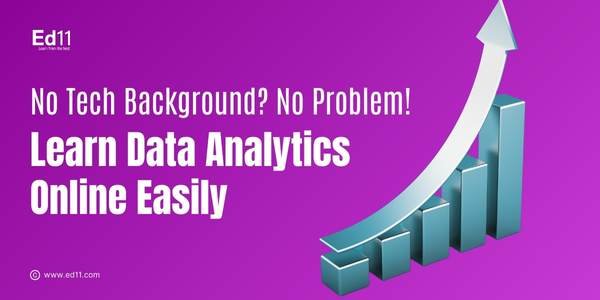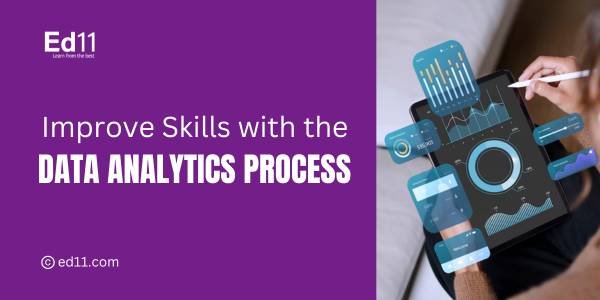Career Opportunities for Data Science Analysts in 2025
Explore top career opportunities for Data Science Analysts in 2025, from AI innovation to big data roles, driving business growth and decision-making.

As a Senior Data Analyst, I have observed how the role of Data Science Analysts has evolved and expanded over the years. In 2025, the demand for Data Science Analysts is expected to explode as industries continue to embrace data-driven strategies. This blog will explore the various career opportunities available for Data Science Analysts in 2025, highlighting industries, roles, required skills, and future trends.
What is Data Science Analysts
A Data Science Analyst is a professional who studies data to find useful information that helps companies make better decisions. They collect, clean, and analyze data to discover patterns and trends. Using tools like Python, SQL, and Excel, they turn complex data into easy-to-understand reports. Data Science Analysts work in many industries, such as healthcare, finance, and technology. They help businesses improve their services, predict future trends, and solve problems. In 2025, their role will become even more important as companies rely more on data. Learning data skills can open many career opportunities.
Future Trends for Data Science Analysts' Careers
-
Automation and AI Integration: Automation will streamline data collection, cleaning, and basic reporting tasks, saving valuable time for Data Science Analysts. This shift allows analysts to concentrate on deeper data exploration and uncovering meaningful insights. They can focus on developing predictive models, optimizing business strategies, and solving complex problems. Automation also enables quicker decision-making by delivering faster, more accurate data processing. As a result, Data Science Analysts can drive innovation and add greater value to organizations.
-
Edge Computing: Processing data closer to its source, known as edge computing, reduces latency and allows faster decision-making. This approach requires Data Science Analysts to develop skills in real-time data processing and analysis. They must understand edge devices, IoT systems, and how to handle decentralized data. Analysts will need to optimize models for limited computing power on edge devices. This shift creates new opportunities for quicker, smarter data-driven solutions.
-
Data Privacy and Ethics: Understanding data regulations and ethical considerations ensures that Data Science Analysts handle data responsibly and legally. This includes following laws like GDPR and CCPA to protect user data privacy. Analysts must be transparent about data usage and avoid biased or misleading analysis. Ethical data handling builds trust with customers and stakeholders. It also prevents legal risks and protects a company’s reputation.
-
Domain-Specific Analytics: Industry-specific knowledge allows Data Science Analysts to understand unique challenges and needs within a sector. This expertise helps them create customized solutions that drive better results. For example, a healthcare analyst can develop models for patient care, while a finance analyst can improve fraud detection. Companies prefer analysts who can apply data insights directly to their industry goals. This specialization gives analysts a competitive edge in the job market.
-
Hybrid Roles: As businesses become more data-driven, Data Science Analysts will increasingly collaborate with marketing, product development, and sales teams. This integration will create hybrid roles where analysts not only interpret data but also contribute to strategy, product design, and customer engagement. Skills in storytelling, market research, and user experience will become valuable alongside technical expertise. These blended roles will enable companies to make faster, data-backed decisions. This shift will open new career paths that combine data analysis with creative and strategic thinking.
The Growing Demand for Data Science Analysts
Data Science Analysts play a crucial role in interpreting complex data and providing actionable insights. Companies across various sectors are investing heavily in data analytics to stay competitive. According to industry reports, the global data analytics market is expected to grow significantly, creating numerous opportunities for Data Science Analysts.
Industries Hiring Data Science Analysts in 2025
-
Healthcare: Data Science Analysts in healthcare also help in developing personalized treatment plans by analyzing genetic data and medical histories. They optimize hospital operations by predicting patient admissions and managing resources efficiently. Additionally, they support medical research by identifying trends in clinical trial data. This leads to faster drug development and better healthcare outcomes.
-
Finance and Banking: Data Science Analysts in the finance sector also analyze market trends to guide investment decisions and improve financial strategies. They use predictive models to minimize losses and optimize profits. Additionally, they help in regulatory compliance by monitoring transactions for suspicious activities. Their insights drive smarter, data-backed financial planning and customer engagement.
-
E-commerce and Retail: They analyze purchase patterns to predict product demand and recommend inventory management strategies. Data Science Analysts also personalize marketing campaigns to target the right customers. By studying website traffic and user interactions, they improve website design and user experience. Their insights help e-commerce companies increase sales and customer satisfaction.
-
Technology and IT Services: Data Science Analysts also play a key role in optimizing algorithms, enhancing Artificial Intelligence (AI) systems, and improving data-driven marketing strategies. They help identify market trends, personalize user experiences, and streamline operations. Additionally, they support decision-making by providing insights from big data. Their expertise ensures tech companies stay competitive and innovative.
-
Manufacturing: Data Science Analysts in manufacturing also help reduce production costs by identifying inefficiencies and improving resource allocation. They analyze quality control data to minimize defects and ensure product consistency. Additionally, predictive maintenance powered by data analytics helps prevent unexpected downtime. This leads to increased productivity and better overall performance.
-
Government and Public Sector: Data Science Analysts help governments analyze large datasets to improve public services and decision-making. They study trends in healthcare, education, and transportation to design effective policies. By predicting future needs, they support disaster management and resource distribution. Their insights lead to smarter, data-driven governance.
Developing Roles for Data Science Analysts
-
Machine Learning Analyst: Machine Learning Analysts design algorithms that help computers learn from data without being explicitly programmed. They test and improve models to ensure accurate predictions and insights. Their work drives innovations in automation, personalization, and decision-making across industries.
-
Data Product Manager: Data Product Managers work closely with Data Science Analysts to identify market needs and create innovative products using data insights. They bridge the gap between technical teams and business goals, ensuring data-driven solutions align with user needs. This role requires strong analytical skills, strategic thinking, and product development expertise.
-
Business Intelligence Analyst: Data Science Analysts turn raw data into valuable insights that guide business strategies. They identify trends, measure performance, and predict future outcomes. Their analysis helps companies make smarter, data-driven decisions for growth and success.
-
AI Data Analyst: Data Science Analysts collaborate with AI systems to process large datasets, identify patterns, and optimize algorithm performance. They help enhance machine learning models for better accuracy and efficiency. This work supports smarter decision-making and innovative solutions across industries.
-
Data Visualization Specialist: Data Visualization Specialists transform complex data into clear and engaging charts, graphs, and dashboards. They use tools like Tableau, Power BI, and Python libraries to present insights effectively. Their visual reports help businesses quickly understand trends and make smarter decisions.
Key Skills for Data Science Analysts in 2025
-
Advanced Statistical Analysis: Statistics helps Data Science Analysts identify patterns, relationships, and trends within data. It enables them to make accurate predictions and informed business decisions. Key concepts like probability, regression, and hypothesis testing are essential for data-driven problem-solving.
-
Programming Skills: Proficiency in Python, R, and SQL enables Data Science Analysts to handle complex data workflows, perform statistical analysis, and develop machine learning models. These languages streamline data extraction, transformation, and visualization. Mastery of these tools boosts efficiency and accuracy in data-driven decision-making.
-
Machine Learning and AI Knowledge: By mastering machine learning algorithms and AI concepts, Data Science Analysts can develop predictive models, automate decision-making, and solve complex problems. This expertise allows them to identify patterns and trends that traditional analysis might miss. Staying updated on AI advancements ensures they remain valuable in a quickly evolving industry.
-
Data Visualization Tools: Using tools like Tableau, Power BI, and D3.js helps Data Science Analysts create clear and interactive data visualizations. These tools make complex data easy to understand for decision-makers. Strong visualization skills are essential for sharing insights and supporting business strategies.
-
Cloud Computing: Understanding cloud platforms like (AWS) Amazon Web Services, Azure, and Google Cloud is crucial for storing, processing, and managing big data efficiently. These platforms offer scalable solutions for data storage, machine learning, and real-time analytics. Proficiency in cloud services allows Data Science Analysts to handle complex data workflows and optimize performance.
-
Important Thinking and Problem-Solving: Data Science Analysts must not only analyze data but also translate complex findings into clear, practical solutions. This skill helps businesses make informed decisions and solve real-world problems. Strong important thinking and problem-solving abilities are essential for turning data insights into impactful actions.
How to Prepare for a Career as a Data Science Analyst in 2025
-
Pursue Relevant Education and Certifications: Pursuing courses and certifications in data science, machine learning, and cloud computing enhances technical skills and keeps you updated with industry trends. These credentials improve job prospects and demonstrate expertise to potential employers. Continuous learning ensures you stay competitive in the evolving data industry.
-
Gain Hands-On Experience: Gaining hands-on experience through real-world projects, internships, and open-source contributions helps Data Science Analysts apply theoretical knowledge to practical problems. It showcases their problem-solving skills and technical expertise. A strong portfolio demonstrates their ability to deliver data-driven solutions to potential employers.
-
Stay Updated with Industry Trends: Staying updated with industry trends helps Data Science Analysts learn about new tools, technologies, and best practices. Engaging in webinars and online forums fosters networking with experts and peers. Active participation in data science communities encourages knowledge sharing and continuous skill development.
-
Develop Soft Skills: Strong communication skills help Data Science Analysts explain complex data findings in simple terms to non-technical teams. Teamwork ensures smooth collaboration with different departments to implement data-driven solutions. Effective problem-solving allows analysts to identify challenges and develop strategies that support business growth.
Data Science Analysts will find opportunities across diverse industries like healthcare, finance, retail, and technology. Companies are increasingly relying on data to improve decision-making, optimize operations, and enhance customer experiences. Emerging technologies such as artificial intelligence, machine learning, and big data analytics are creating new roles and specializations for Data Science Analysts. Professionals with expertise in cloud computing, data visualization, and cybersecurity will be in high demand. Continuous learning and adapting to new tools will be crucial for career growth. Networking with industry experts and attending data science events can also open doors to exciting roles. With the right skills and mindset, Data Science Analysts can shape the future of business and technology.



















